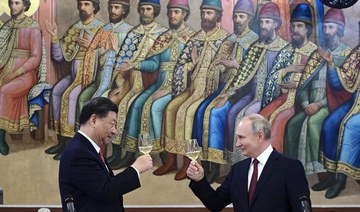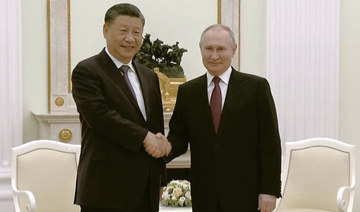MOSCOW: Russian President Vladimir Putin said after talks with Chinese leader Xi Jinping on Tuesday that Chinese proposals could be used as the basis of a peace settlement in Ukraine, but that the West and Kyiv were not yet ready.
In a joint statement at the end of Xi’s state visit to Moscow, the two men cautioned against any steps that might push the Ukraine conflict into an “uncontrollable phase,” adding pointedly that there could be no winners in a nuclear war.
Putin accused Western powers of fighting “to the last Ukrainian,” while Xi reiterated China’s “neutral position” on Ukraine and called for dialogue.
“We believe that many of the provisions of the peace plan put forward by China are consonant with Russian approaches and can be taken as the basis for a peaceful settlement when they are ready for that in the West and in Kyiv. However, so far we see no such readiness from their side,” Putin said.
China’s proposal — a 12-point paper calling for a de-escalation and eventual cease-fire in Ukraine — lacks details on how to end the war.
The United States has been dismissive of the Chinese proposal, given Beijing’s refusal to condemn Russia over Ukraine, and says a cease-fire now would lock in Russian territorial gains and give Putin’s army more time to regroup.
HIGHLIGHTS
• Putin calls China Russia’s most important economic partner
• Xi is on a state visit to Moscow
• Putin says the West is not ready for peace in Ukraine
Ukraine has welcomed China’s diplomatic involvement but says Russia must pull out its troops and underlines the importance of Ukraine’s territorial integrity.
BURGEONING TIES
The Kremlin talks were intended to cement the “no limits” partnership the two leaders announced last February, less than three weeks before Russia invaded Ukraine.
They signed a series of documents on a “strategic cooperation” after what Putin described as “successful and constructive” talks showing China was clearly now Russia’s most important economic partner.
“I am convinced that our multi-faceted cooperation will continue to develop for the good of the peoples of our countries,” Putin said in televised remarks.
Xi’s state visit is a major boost to Putin as he squares off against what he sees as a hostile West bent on inflicting a “strategic defeat” on Russia.
The Chinese leader visited Moscow days after an international court issued an arrest warrant for Putin over Russia’s actions in Ukraine, where Russian forces have made little progress in recent months despite suffering heavy losses.
In their joint statement, Xi and Putin also called on the United States to stop “undermining global strategic security” and to cease developing a global missile defense system.
While pledging more regular joint military drills, however, the two leaders said the closer relationship between the two countries was not directed against any third nation and that it did not constitute a “military-political alliance.”
POWER OF SIBERIA DETAILS UNFINISHED
Putin said that Russia, China and Mongolia had completed “all agreements” on finishing Russia’s coveted pipeline to ship Russian gas to China, and that Moscow was ready to increase oil exports to Beijing.
But a joint statement after the talks said only that the parties involved in the pipeline — which Putin has called just before Xi’s visit as “the deal of the century” — “will make efforts to advance work on the study and approval” of the pipeline.
The English versions of Xi’s two statements issued after the meetings do not mention the pipeline.
Russia’s Deputy Prime Minister Alexander Novak told reporters that there are still details that need to be worked out.
“Instructions were given to companies to work out the details of the project in detail and to sign it as soon as possible,” Russia’s state RIA news agency cited Novak as saying.
“Orders have been given to ensure the agreement’s conditions. We hope that it will be this year.”
The planned Power of Siberia 2 pipeline would deliver 50 billion cubic meters (bcm) of natural gas per year from Russia to China via Mongolia. Moscow put forward the idea many years ago, but it has gained urgency as Russia turns to China to replace Europe as its major gas customer.
Russia’s Gazprom already supplies gas to China through an existing Power of Siberia pipeline under a 30-year, $400 billion deal launched at the end of 2019. That pipeline spans some 3,000 km (1,865 miles).
Russia’s gas exports to China are still a small fraction of the record 177 bcm it delivered to Europe in 2018-19.
Putin said on Tuesday Russia would deliver at least 98 bcm of gas to China by 2030.
























